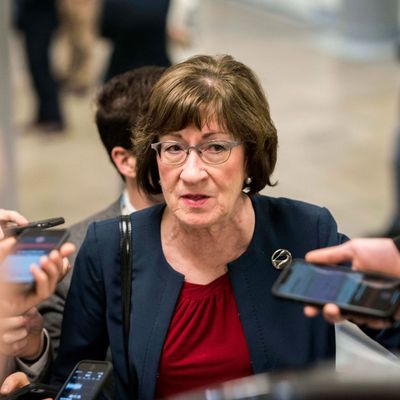
For all the talk about the 2020 presidential contest, Democrats also know how important it is for them to take back control of the U.S. Senate — either to block a vengeful second-term President Trump from consummating his conquest of the federal judiciary, or to give a Democratic successor a fighting chance to get something done. But flipping the Senate next year will be really difficult, with Republicans currently holding 54 seats, and with one Democrat up next year, Doug Jones of Alabama, widely perceived as nearly a lost cause (unless Republicans again send up Roy Moore to take him on, which is unlikely). Most of the GOP senators up for reelection in 2020 are from solidly red states, which means that those who are not — particularly Susan Collins of Maine and Cory Gardner of Colorado, whose states were carried by Hillary Clinton in 2016 — really need to be taken down if Democrats are to regain control.
Of the two blue-state senators, Collins would superficially look like the toughest to beat. She’s been in the Senate since 1996, where she has split with her party just often enough to cultivate her image as a brave defender of Maine’s (and New England’s) all-but-lost moderate Republicanism. (She’s one of the last pro-choice Republicans in Congress). Her three reelection bids have shown her steadily improving her performance; she won 62 percent of the vote in 2008 and 68 percent in 2014. But the latest senatorial job-approval numbers from Morning Consult show Collins losing popularity steadily:
Collins’ net approval — the share of voters who approve of her job performance minus the share who disapprove — has fallen by 44 percentage points since the first quarter of 2017, when Trump took office. Forty-five percent of Mainers approve of Collins and 48 percent disapprove in the latest rankings, down 16 net points since quarter one of this year, as her campaign gears up in earnest to face a Democratic challenge from state House Speaker Sara Gideon.
It’s a bad time to go underwater in job approval. But it’s not surprising. Aside from the general partisan polarization that has intensified since Trump took office, Collins supported her party and president on two very high-profile issues when a big spotlight was on her as a potential game-changer: the 2017 tax bill and the 2018 Supreme Court confirmation of Brett Kavanaugh. Collins explained the tax vote in part as motivated by a promise from Mitch McConnell that the Senate would subsequently take up two Obamacare stabilization bills. He broke that promise, which made Collins look a bit foolish. Her dramatic and very firm announcement of support for Kavanaugh, which clinched his confirmation, had immediate consequences: a crowdfunding drive in Maine to raise money for Collins’s eventual 2020 opponent. To date, it has raised over $4 million. And yes, Sara Gideon is currently favored to win the Democratic nomination and will have national Democratic backing (though lefty-ish rival Betsy Sweet, who exceeded expectations as a gubernatorial candidate last year, is a credible opponent).
Morning Consult’s senatorial job-approval updates had mixed news for other vulnerable senators. Gardner’s approval ratio is dead even at 37/37. North Carolina Republican Thom Tillis is at 33/35. Doug Jones, amazingly, is in positive territory at 39/37.
But Jones’s situation is a reminder that in all the competitive Senate races candidates will be dealing with a phenomenon they cannot control: a volatile, and likely very intense, presidential election, in a political climate in which ticket-splitting is at a low ebb. In the last presidential election year, not a single state went one way in the presidential contest and the other in a Senate race. Although midterm elections are different, the latest one also showed a continuation of a recent decline in ticket-splitting. This is why Doug Jones is in deep trouble despite relative sunny approval ratings. And it may be as big a problem for Collins and Gardner as their own meh levels of popularity. Again using Morning Consult’s data, Trump’s current net approval rating in Collins’s Maine is -14, and in Gardner’s Colorado it’s -13. Trump’s truly dramatic loss of popularity in Iowa (a state he won by nine points in 2016) is why Joni Ernst shouldn’t be overconfident either: the president’s net approval there is -15.
But as no one is likely to forget, Trump’s national favorability ratings were terrible even as he was being lifted to the presidency in 2016. Some of that has to do with pro-Trump turnout patterns that are significantly less likely to recur in 2020 given the many voters who now regret staying home or casting a protest vote. Much of it reflects Hillary Clinton’s parallel unpopularity, which the Trump campaign and its conservative-media allies will try to replicate for whoever Democrats nominate (spoiler alert: she or he will be called “socialist” and “radical” roughly a thousand times a day). But again, these dynamics will overshadow individual Senate campaigns. The best insulation a senator like Collins can supply in this environment is to be wildly popular. That doesn’t appear to be in the cards for her this time around.






























